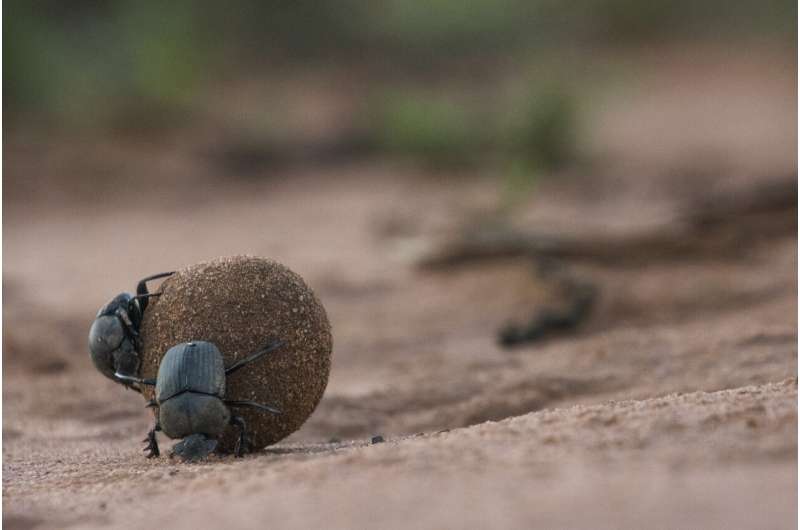This article has been reviewed according to Science X's editorial process and policies. Editors have highlighted the following attributes while ensuring the content's credibility:
fact-checked
trusted source
proofread
Dung dynasty: The plant boosting powers of beetle recyclers

Dung beetles, those unsung heroes of the insect world renowned for their prowess in breaking down cattle dung, have now been found to have a positive impact on plant growth.
A multi-level meta-analysis of 24 studies spanning 14 countries and published in Proceedings of the Royal Society B: Biological Sciences has revealed the humble beetles impacted plant growth by 17%.
Lead author, Ph.D. candidate Daniel Anderson from The University of Western Australia's School of Biological Sciences, said dung beetles had long been recognized for their role in recycling nutrients and enhancing environmental health but the study results revealed another remarkable aspect to their abilities.
"Dung beetles have been imported into many countries to break down cattle dung, which left unburied, provides habitat for nuisance flies and creates areas of rank pasture that cattle avoid," Anderson said.
"A well-known consequence of this dung recycling was thought to be increased plant growth but study results over the past half a century had been mixed.
"We assessed what impact dung beetles have on plant growth overall, and if there were any factors that influenced the dung beetle and plant growth relationship and did this with a multi-level meta-analysis, a more precise method of averaging."
Anderson said the research team also investigated what factors influenced the magnitude of plant growth and found that plant measurement type was important.
"When dung beetles accessed dung, plant weights generally increased more than plant lengths," he said.
"It appears that the nutrients from buried dung are incorporated into plant shoots, allowing for thicker leaves with greater photosynthetic capability, the process by which plants convert light into chemical energy to fuel their growth.
"Additionally, the recycled nutrients might have caused a proliferation of root hairs, which would allow for greater nutrient uptake and take away the need for investment in longer plant roots.
"We also found that plant growth was greater when more beetles accessed dung, probably because it increases the amount of nutrients available to plants and increases growth."
Anderson said the findings not only highlighted the ecological significance of dung beetles but also underscored the importance of incorporating natural capital into resource and land-use decisions.
"By recognizing the invaluable contributions of organisms like dung beetles, policymakers can better steward our ecosystems for future generations," he said.
More information: Daniel J. Anderson et al, Dung beetles increase plant growth: a meta-analysis, Proceedings of the Royal Society B: Biological Sciences (2024). DOI: 10.1098/rspb.2023.2885
Provided by University of Western Australia




















